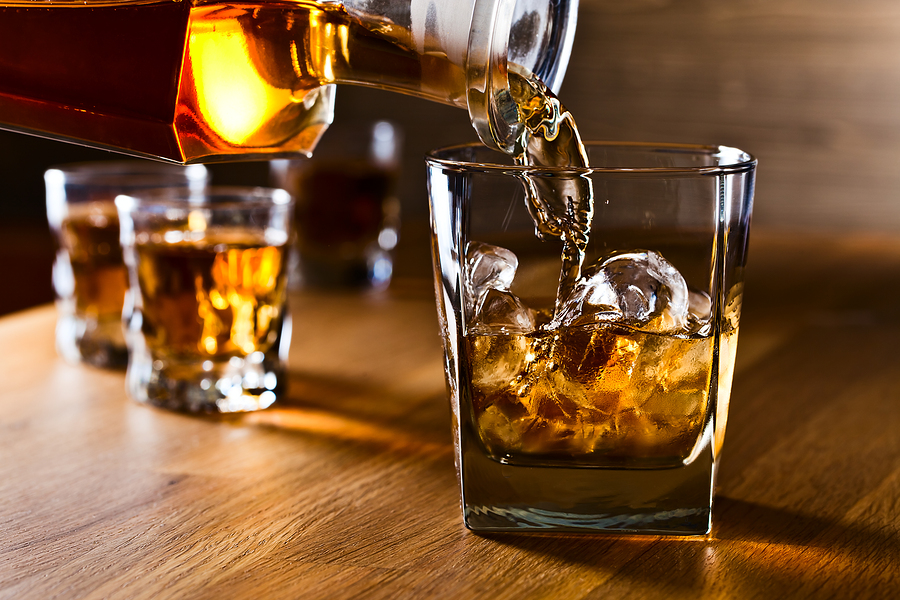
Have you ever been at a bar and as you were drinking something a friend ordered you, you confidently asked, “Is this Scotch or whiskey?” Yes? Maybe people around you were drinking Scotch and mentioned how peaty it was and you offered to share several fun facts with them about the dog from the Little Rascals. Yes? They laughed at you, didn’t they? It didn’t feel good, did it? You wanted to go home and drink domestic beer, in a can, alone, hoping they’d all choke on that smooth and delicious whiskey.
When it comes to learning the difference between Whiskey, Bourbon, and Scotch, there is a TON of information.We’ve all been there. Er, Um, people I know have been there. When it comes to learning the difference between Whiskey, Bourbon, and Scotch, there is a TON of information: The process of malting, brewing, distilling, and maturation; the types of wood for the casks or barrels they matured in; the kind of grains, or blends or… it goes on like this. But you’re not going for a degree in whiskey science. You just want to drink great booze in the company of other adults and not sound like a massive dipshit while doing it.
If you’re going for this basic understanding, you’d start by learning some of the regional differences. If this is the case, you’d focus on whiskies from three countries: The United States (Bourbon or whiskey), Scotland (Scotch) and Japan (whisky). Sorry Ireland, but I know how you get when you’re continually associated with booze.
United States
The main distinction in the U.S. is between Bourbon and whiskey. All Bourbons are whiskey, but not all whiskeys are Bourbon. You can think of Bourbon like a slightly fancier cousin to whiskey.First things first – in the U.S., we spell whiskey with the “e.” Aside from us (and Ireland!), the rest of the world spells it whisky – no “e” – and it has nothing to do with our refusal to use the metric system. It is mainly for the same reason we would never say that “grey is our favorite color” (U-S-A! U-S-A!). The main distinction in the U.S. is between Bourbon and whiskey. All Bourbons are whiskey, but not all whiskeys are Bourbon. You can think of Bourbon like a slightly fancier cousin to whiskey. Our friends at Maker’s Mark (who spell it whisky, due to their Scottish heritage) have this nifty info graphic on their site that outlines many intricate differences between Bourbon and plain ol’ whiskey. Bourbon must be made with a grain mixture of at least 51% corn. It can be no stronger than 160 proof, and must be aged in new, charred oak containers, whereas non-Bourbon can be strong enough to take paint off walls, and be aged in a bathtub. It should also be noted that, even if Bourbon is made according to the above guidelines, you couldn’t call it Bourbon unless it was made in the U.S. The rule used to be that you couldn’t call it Bourbon if it was made outside of Kentucky – which is why Jack Daniel’s, made to the specifications of Bourbon, has always been called Tennessee whiskey.
Scotland
Due to the popularity of perennial cocktail favorite, the Jack and Coke, most drinkers have tasted Bourbon or whiskey. But Scotch may very well be new ground for you.
All it takes is a sip of Scotch and a sip of American whiskey and you’ll notice a distinct difference in the flavor.Scotch is just whisky (no “e”) that’s made in Scotland. The key difference between American whiskey and Scotch is the ingredients. U.S. whiskey is made from grains like corn, rye, and wheat. In Scotland, they mostly use malted barley. The process of making it is similar, except that decomposed vegetation called peat is used in the malting process (Peaty!). Scotland allows a proof of 94.8 percent alcohol by volume (I suck at math, but I guarantee that will get you shit-faced). And the maturation guidelines are different: By law, to be Scotch it has to mature at least three years, whereas there are no maturation thresholds to meet to be called anything in the states (even Bourbon).
Are you confused yet? Don’t be. All it takes is a sip of Scotch and a sip of American whiskey and you’ll notice a distinct difference in the flavor. And if you don’t have a discerning palate, your wallet will be the judge: Be prepared to drop a dime on Scotch, because the good ones are typically more expensive than U.S. whiskey. It makes sense. It is the lifework of an entire proud nation and one of their top exports. (They export 40 bottles of Whisky every second.) But, according to the Wall Street Journal, American whiskeys are currently outselling Scotch due to a “nationwide trend toward locally made products.”


